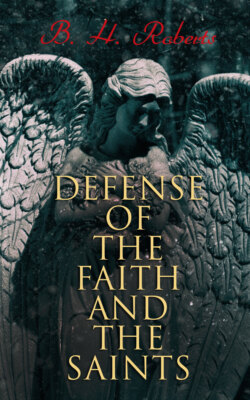Читать книгу Defense of the Faith and the Saints - B. H. Roberts - Страница 20
На сайте Литреса книга снята с продажи.
D. A. Holcomb, Esq., Dunlap, Iowa.
ОглавлениеTable of Contents
DEAR SIR:—Your letter of the 21st ult., addressed to President Joseph F. Smith and Counselors, asking "which one of the religious societies has opposed the faith and doctrine of the Church the most," etc., has been handed to me by President Smith, with a request that I answer your questions.
In the first place I call your attention to the fact that it is not a matter of astonishment or of any great amount of anxiety to us that the churches of this world oppose the Church of Christ. It has become a matter of course from our point of view, and really under the circumstances we do not see how it could be otherwise, for the first word of the Lord to Joseph Smith was to the effect that the churches of the world were all wrong, that is, in error; that their professors of religion drew near to the Lord with their lips while their hearts were far from him; that they taught for doctrine the commandments of men, and Joseph Smith was commanded to join none of them, for God did not acknowledge them as his Church or kingdom. After such a declaration the good will of sectarian Christendom was naturally out of the question, yet, of course, the truth had to be told. The theological rubbish that had accumulated for ages had to be swept away that the rocks of truth might be made bare for the erection of that structure, the Temple of God—the Church of Christ.
As to which of the several churches has been most opposed to the faith and doctrines of the Church it would be difficult to say definitely, except to say that up to the present time the Catholic Church has not manifested any hostility' in any way as an organization. A few individual Catholic prelates have had their fling at us, but I think they have not passed resolutions against our organization, chiefly for the reason, as I think, that we have done but little work as yet in Catholic countries; and then, too, it is quite possible that the Catholic clergy count us as one among the many protestant sects, and think us no worse than the rest of what they consider the "separated brethren." As for the Protestant brood, you may take the Methodists, Presbyterians, Baptists, Campbellites, and Josephites as the most active of our opponents, judging from the fulminations they reel off against us in the form of resolutions and petitions to Congress asking that we be "suppressed" or "crushed." It would be difficult to say which of these is the most opposed. I think I am safe in saying they are all about equally bitter, but thank the Lord there is no proportion between their bitterness and their power to do us injury. The rest of the Protestant sects give us but little trouble, at least in any formal way, and the opposition expressed in frantic resolutions by those I have named merely serve to make matters interesting and keep Mormonism well to the fore in public attention; and as for "annoyance"—well, it is hardly worth while being annoyed. Have you not read the golden words, "We can do nothing against the truth, but for the truth?" and that other saying, equally comforting to those who are called upon to face the wrath of men for the kingdom of heaven's sake, "Surely the wrath of men shall praise thee; the remainder of wrath shalt thou restrain?" So we are very comfortable, thank you, and not worried and not "annoyed" and not hurt by the opposition of men. We have the truth and rejoice in it, and intend to make it known just as far as it is possible for us to proclaim it. In our view those who oppose it, pass resolutions against our faith and ourselves, are but God's advertising agents, to present to the attention of the world the thing which he has planted in the earth; and we amuse ourselves sometimes by thinking what a surprised lot of fellows those sanctimonious divines who "resolute" against us with such vigor will be when they wake up and discover that they have helped instead of hindered God's work; but as for being "annoyed"—pshaw!
Very truly yours.
B. H. ROBERTS.
* * * * * * * * * *
Looking through an old scrap book the other day, I found in it a clipping from the "Newark (New Jersey) News," containing a letter from Salt Lake City, by J. Martin Miller, which describes in a very admirable way the attitude of a Jewish Rabbi and a Catholic Bishop toward the Mormon people, and as their attitude is one of fairness I take pleasure in recording the evidence of it here. Mr. Miller's letter to the "Newark News" was written about two months before my letter to Mr. Holcomb—in June, 1903:
